German Chancellor Olaf Scholz said Berlin needs to change the way it deals with Beijing and reduce “risky dependencies” as China’s communist leadership has made increased “avowals of Marxism-Leninism” and as bilateral tensions between the two countries simmer.
Scholz made the remarks in an op-ed published on Nov. 3 in Politico, a day ahead of the German leader’s first state visit to Beijing, where he will confront the dilemma on how closely to remain tied to China amid strained relations over such issues as lopsided trade ties, the Hong Kong crackdown, and Xinjiang concentration camps.
“The outcome of the Communist Party Congress that has just ended is unambiguous: Avowals of Marxism-Leninism take up a much broader space than in the conclusions of previous congresses,” Scholz wrote. “As China changes, the way that we deal with China must change, too.”
‘Business as Usual’ Not an Option
Scholz wrote that his trip to Beijing comes “precisely because ‘business as usual’ is no longer an option” under circumstances that include China’s strict measures to contain COVID-19 that have stunted business travel and as Chinese leader Xi Jinping vowed to make other countries more dependent on its supply chains.
The German leader mentioned China’s “dual circulation” economic strategy that he said is meant to bolster its domestic market and make Beijing less dependent on foreign trade partners. At the same time, Scholz cited the Chinese leader’s 2020 speech in which he vowed to utilize Chinese technologies to “tighten international production chains’ dependence of China.”
“We take statements such as this seriously, and will, therefore, dismantle one-sided dependencies in the interest of smart diversification, which requires prudence and pragmatism,” Scholz wrote.
‘Risky Dependencies’
The German leader said that there is a “significant amount” of Sino-German trade where there is no risk of “dangerous monopolies.” At the same time, he cautioned of “risky dependencies” in areas like key raw materials, rare earths, and cutting-edge technologies, while pledging to cut Germany’s reliance.
“With Chinese investment in Germany, too, we will differentiate based on whether this business creates, or exacerbates, risky dependencies,” he continued.
The German leader said that China remains an important business and trade partner, adding that “we don’t want to decouple from it,” referring to the notion of severing ties entirely. But he added that Germany is “too far” from a reciprocal relationship with China in areas like market access and legal certainty for German nationals.
‘Resolving Conflicts Peacefully’
Scholz said Germany would seek cooperation where it lies in both countries’ interest but that Berlin would “not ignore controversies.”
“Our policy is aligned with the aims of preserving the rules-based order, resolving conflicts peacefully, protecting human rights and the rights of minorities, and ensuring free and fair world trade,” Scholz wrote.
Xi has repeatedly brushed off criticism on issues like human rights in China and has sought to maintain close business ties with Europe as relations with Washington have become increasingly strained, especially around Taiwan.
‘More Aggressive Abroad’
U.S. Secretary of State Antony Blinken recently warned that Beijing is determined to wrest control of the self-governing island, potentially by force, on a “much faster timeline” than previously believed.
Blinken made the remarks on Oct. 17 at an event jointly hosted by the Hoover Institution and Stanford University, where he said that China under Xi has become “more repressive at home” and “more aggressive abroad.”
While the United States ended formal diplomatic ties with Taiwan in 1979 and switched recognition to Beijing under the “One China” policy, Washington has maintained a robust unofficial relationship with the self-governing island and is legally bound to provide it with the arms necessary to defend itself.
Blinken said U.S. policy on Taiwan has been managed well and in a way that has avoided conflict with Beijing while allowing the people of Taiwan “to really flourish,” adding that this situation is now changing.
“Instead of sticking with the status quo that was established in a positive way, a fundamental decision that the status quo was no longer acceptable and that Beijing was determined to pursue reunification on a much faster timeline,” Blinken said.
“And if peaceful means didn’t work, then it would employ coercive means and possibly, if coercive means don’t work, maybe forceful means—to achieve its objectives,” Blinken added.
‘War to Seize Taiwan’?
Austin Bay, a retired colonel in the U.S. Army Reserve and a teacher of strategy and strategic theory at the University of Texas–Austin, argued in a recent op-ed in The Epoch Times that China has become emboldened to pursue its aims by military means.
“Revving China’s economy isn’t Xi’s game. War is Xi’s aim, a war to seize Taiwan that leads to a big one with the United States,” Bay wrote.
“As Xi calculates, given the Biden administration’s haplessness, the war ends in a stalemate. With American weakness exposed, America’s Asian allies kowtow to Beijing and Xi’s China reigns preeminent in east Asia,” he added.
Scholz, in his op-ed, said that he believes China will play a “key role on the world stage” going forward but added that this is no justification for “a quest for hegemonic Chinese dominance, or even a Sino-centric world order.”
The German leader’s visit comes as Germany’s longtime trade surplus with China has flipped to a deficit amid Beijing’s falling imports.
From The Epoch Times


